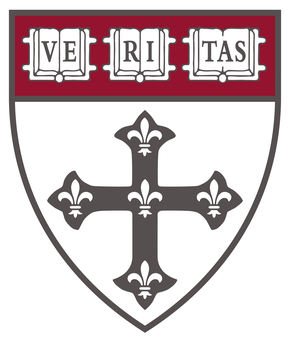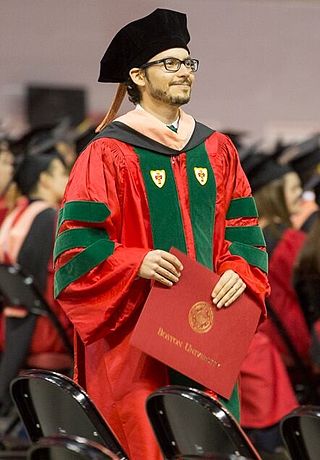
Postgraduate education, graduate education, or graduate school consists of academic or professional degrees, certificates, diplomas, or other qualifications usually pursued by post-secondary students who have earned an undergraduate (bachelor's) degree.
A doctorate or doctoral degree is a postgraduate academic degree awarded by universities and some other educational institutions, derived from the ancient formalism licentia docendi.
Habilitation is the highest university degree, or the procedure by which it is achieved, in Germany, France, Italy and some other European and non-English-speaking countries. The candidate fulfills a university's set criteria of excellence in research, teaching, and further education, which usually includes a dissertation. The degree, sometimes abbreviated Dr. habil., PD, Dr hab., or D.Sc., is often a qualification for full professorship in those countries. The degree conferral is usually accompanied by a public oral defence event with one or more opponents. Habilitation is usually awarded 5–15 years after a PhD degree or its equivalent. Achieving this academic degree does not automatically give the scientist a paid position, though many people who apply for the degree already have steady university employment.
A Doctor of Science is a science doctorate awarded in a number of countries throughout the world.

Fred Weldon Leslie is an American scientist who flew on the NASA STS-73 Space Shuttle mission as a payload specialist.

The Harvard T.H. Chan School of Public Health is the public health school of Harvard University, located in the Longwood Medical Area of Boston, Massachusetts. The school grew out of the Harvard-MIT School for Health Officers, the nation's first graduate training program in population health, which was founded in 1913 and then became the Harvard School of Public Health in 1922.

The UCLA School of Dentistry is the dental school of the University of California, Los Angeles (UCLA) located in the Center for Health Sciences building in the Westwood neighborhood of Los Angeles, California, United States. The school has several educational and training programs, conducts oral and dental health research, and offers affordable dental care at three locations: Westwood, Venice, and Inglewood. The school also participates in several outreach endeavors, including numerous health fairs during the year, STEM pipeline programs and provides dental care for underserved populations in the region. The School of Dentistry is considered among the nation's best research-intensive dental schools.
A terminal degree is the highest-level university degree that can be achieved and awarded in an academic discipline or professional field. In other cases, it is a degree that is awarded because a doctoral-level degree is not available nor appropriate. The two main types of terminal degrees are academic or professional.
Doctor of Letters also termed "Doctor of Literature" in some countries is a terminal degree in the arts, humanities and social sciences that, depending on the country, is a higher doctorate after the Doctor of Philosophy (Ph.D.) degree or equivalent to a higher doctorate, such as the Doctor of Science or Doctor of Laws (LL.D). It is awarded in many countries by universities in recognition of superior accomplishment in the Arts, Social Sciences or humanities, such as original contributions to the creative or cultural arts, or scholarship in Social Sciences and humanities and other merits. It may be conferred as an earned degree upon the completion of a regular doctoral course of study, usually including the development and defense of an original dissertation, or may be conferred as an earned higher doctorate after the submission and academic evaluation of a portfolio of sustained scholarship, publications, research, or other scientific work of the highest caliber.
A biomedical scientist is a scientist trained in biology, particularly in the context of medical laboratory sciences or laboratory medicine. These scientists work to gain knowledge on the main principles of how the human body works and to find new ways to cure or treat disease by developing advanced diagnostic tools or new therapeutic strategies. The research of biomedical scientists is referred to as biomedical research.

A Medical Laboratory Scientist (MLS) or Clinical Laboratory Scientist (CLS) or Medical Technologist (MT) performs diagnostic testing of blood and body fluids in clinical laboratories. The scope of a medical laboratory scientist's work begins with the receipt of patient or client specimens and finishes with the delivery of test results to physicians and other healthcare providers. The utility of clinical diagnostic testing relies squarely on the validity of test methodology. To this end, much of the work done by medical laboratory scientists involves ensuring specimen quality, interpreting test results, data-logging, testing control products, performing calibration, maintenance, validation, and troubleshooting of instrumentation as well as performing statistical analyses to verify the accuracy and repeatability of testing. Medical laboratory scientists may also assist healthcare providers with test selection and specimen collection and are responsible for prompt verbal delivery of critical lab results. Medical Laboratory Scientists in healthcare settings also play an important role in clinical diagnosis. An estimated 70% of medical decisions are based on laboratory test results and MLS contributions affect 95% of a health system's costs.
The Master of Public Health(MPH), Master of Science in Public Health (MSPH), Master of Medical Science in Public Health (MMSPH) and the Doctor of Public Health (DrPH), International Masters for Health Leadership (IMHL) are interdisciplinary professional degrees awarded for studies in areas related to public health. The MPH degree focuses on public health practice, as opposed to research or teaching. Master of Public Health programs are available throughout the world in Schools of Public Health, Programs in Public Health, Medical Schools, and Schools of Public Affairs. MPH degrees, in addition to including a core curriculum, will usually also let students pursue a specialization in a specific field, such as epidemiology, biostatistics, or health management.
Simula Research Laboratory is a Norwegian non-profit research organisation located in Oslo, Norway.

A Doctor of Public Health is a doctoral degree awarded in the field of Public Health. DrPH is an advanced and terminal degree that prepares its recipients for a career in advancing public health practice, leadership, research, teaching, or administration. The first DrPH degree was awarded by Harvard Medical School in 1911.
A Doctor of Philosophy is a terminal degree that usually denotes the highest level of academic achievement in a given discipline and is awarded following a course of graduate study and original research. The name of the degree is most often abbreviated PhD, pronounced as three separate letters.
Academic ranks in Spain are the titles, relative importance and authority of professors, researchers, and administrative personnel held in academia.
Academic ranks in Russia are the conferred titles, indicating relative importance and power of professors, researchers, and administrative personnel in Russian academia and scientific institutions. The rank “certifies” the demonstrated ability of an individual to function in the specific academic position(s).

A clinical pharmaceutical scientist is a licensed, practicing pharmacist who also functions as an independent researcher in the pharmaceutical sciences. Clinical pharmaceutical scientists are a type of clinician scientist, analogous to physician-scientists.
Megan Blanche Murray is an American epidemiologist and an infectious disease physician. She is the Ronda Stryker and William Johnston Professor of Global Health in the Department of Epidemiology at the Harvard T.H. Chan School of Public Health.






